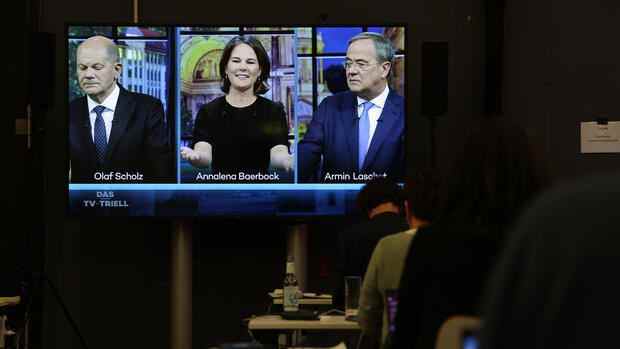The top candidates from the Union, SPD and Greens in the last triall before the federal election.
(Photo: Getty Images)
It was an entertaining third TV triad between Annalena Baerbock, Olaf Scholz and Armin Laschet. Anyone who still did not know after the first two formats who would like to form a coalition with whom after the federal election on September 26th, can no longer say that after this Sunday evening.
For a long time the formation was called red-green against the Union. Whether on the subject of Hartz IV, climate protection or the closing words. The SPD chancellor candidate campaigned for the Green politician. In the end, Scholz and Baerbock agreed: The union with Armin Laschet should become part of the opposition. Only with whom they want to govern then – whether with the FDP or the Left Party – they did not say.
Baerbock was quick-witted and easy-going
The surprise on this Sunday evening was the Green Chancellor candidate Baerbock, who brought the two gentlemen into trouble with social security and, of course, climate protection.
Your quick-wittedness brought momentum to the debate. But the new looseness also showed that, in view of the polls, Baerbock only plays on the court and has given up all ambitions for the Chancellery. She actually had nothing more to do with the triell. Maybe that’s why she was only in third place in the quick poll after the show, behind Armin Laschet and Olaf Scholz.
Top jobs of the day
Find the best jobs now and
be notified by email.
Scholz without red ears this time
The SPD chancellor candidate Scholz won this time too and was even able to leave the TV studio without red ears. The scandal from Cum-ex, Wirecard to the supposed money laundering affair were only marginally addressed, ironically not by the two moderators, but by Ms. Baerbock. Otherwise, the Federal Minister of Finance was proud and tried to keep his own gate clean. In no case should someone remind him too often that he is the vice-chancellor in the country in view of the grievances in digitization, the fight against pandemics and the protection of internal security. He succeeded, if only because of the selection of the thematic blocks.
Laschet played defensively
Union chancellor candidate apparently did not want to go into election campaign mode, with the exception of a few delicate references to a red-red-green alliance. He had already switched to attack in the second triell. He was able to score a bit in terms of personality values. This gave rise to hope in their own camp, and at least the gap between them and Olaf Scholz has not widened.
However, the trend reversal invoked by CSU boss Markus Söder did not appear in the polls. The Union hopes for the many who are undecided. The people in Germany do not want a red-red-green coalition. In the voting booth, many could decide for the CDU and CSU, so the strategists hope.
Laschet got better from Triell to Triell. On his first appearance, he cornered Scholz by demanding that a left-wing alliance be excluded. At the second meeting he went on the attack and really enraged the SPD candidate for chancellor.
The hypothermic Hanseatic man even got red ears when Laschet said to him: If you were finance minister with me, we would have a real problem. In the third triell, his strategists had apparently advised him not to make any more mistakes. He was only able to set a few accents on issues relating to internal security.
Not a real game changer
As in previous years, the TV debates were not a real game changer. Whether it was the ultimate wisdom of the television companies to produce three of these formats may be an open question. There was not much discussion about the actual topics of the future for Germany. The areas in which the prosperity of tomorrow will be generated were only touched on the surface. That may be due to the moderators, but obviously the politicians didn’t want to score with it either.
Interview with the top candidates:
For someone who was not there at the Trielli, it could be very bitter. Markus Söder and his CSU could fail in Bavaria because of the five percent hurdle. They would move into the Bundestag with their direct mandates. But it would have a symbolic meaning. The CSU would have shrunk to a regional force.
In addition, the election in Bavaria is just around the corner. It has not yet been decided whether Söder would prefer a supposedly weak Laschet as Chancellor or a traffic light coalition. If this coalition existed in the federal government, Söder could do pure CSU.
One thing is certain: a fourth triall is certainly no longer needed before the general election.
